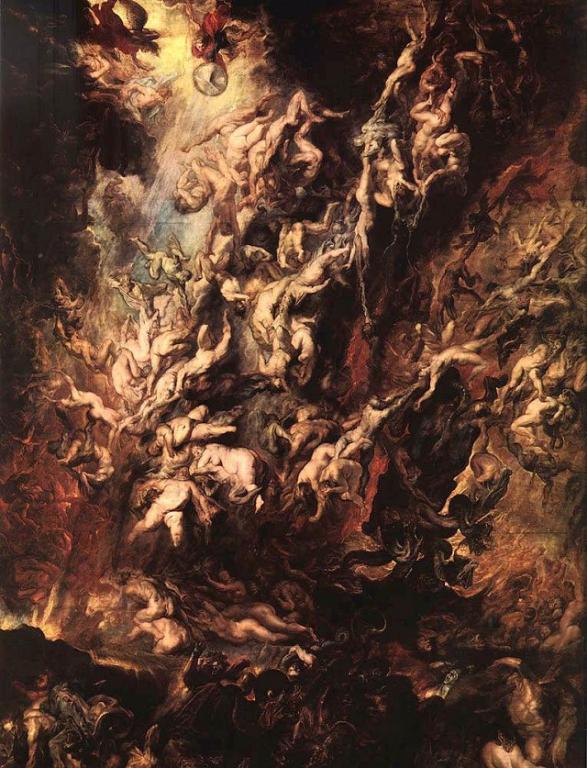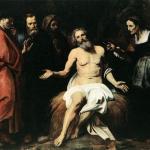
Luther: “he damns the undeserving, . . . they cannot prevent themselves from being ungodly.”
***
All the cited words below are Luther’s own, from various translations of The Bondage of the Will (his own favorite work). Sources are non-Catholic ones: with one noted Catholic exception.
* * * * *
Summary of English Versions of The Bondage of the Will (Luther Treatise of 1525)
Translation by J. I. Packer and O. R. Johnston, Grand Rapids, Michigan: Fleming H. Revell, 1957.
Translation by Phillip Watson (based on WA 18 600-787); in Luther’s Works [LW], Volume 33.
Luther and Erasmus: Free Will and Salvation, edited by Ernest Gordon Rupp and Philip S. Watson, LCC XVII, Philadelphia: Westminster, 1969.
Translation by Edward Thomas Vaughan, 1823.
Translation by Henry Cole, 1823.
Combination of the Vaughan and Cole versions , by Henry Atherton, 1930.
***
***
In short, if we are under the god of this world, away from the work and Spirit of the true God, we are held captive to his will, as Paul says to Timothy [II Tim. 2:26], so that we cannot will anything but what he wills. For he is that strong man armed, who guards his own palace in such a way that those whom he possesses are in peace [Luke 11:21], so as to prevent them from stirring up any thought or feeling against him; otherwise, the kingdom of Satan being divided against itself would not stand [Luke 11:18], whereas Christ affirms that it does stand. And this we do readily and willingly, according to the nature of the will, which would not be a will if it were compelled; for compulsion is rather (so to say) “unwill.” But if a Stronger One comes who overcomes him and takes us as His spoil, then through his Spirit we are again slaves and captives—though this is royal freedom—so that we readily will and do what he wills. Thus the human will is placed between the two like a beast of burden. If God rides it, it wills and goes where God wills, as the psalm says: “I am become as a beast [before thee] and I am always with thee” [Ps. 73:22 f.]. If Satan rides it, it wills and goes where Satan wills; nor can it choose to run to either of the two riders or to seek him out, but the riders themselves contend for the possession and control of it. What if I can prove from the words you yourself use in asserting freedom of choice that there is no free choice? What if I convict you of unwittingly denying what you seek so carefully to affirm? Frankly, unless I do so, I swear to regard everything I write against you in the entire book as revoked, and everything your Diatribe either asserts or queries against me as confirmed. (LW, vol. 33, 65)
So man’s will is like a beast standing between two riders. If God rides, it wills and goes where God wills: as the Psalm says, ‘I am become as a beast before thee, and I am ever with thee’ (Ps. 72.22-3). If Satan rides, it wills and goes where Satan wills. Nor may it choose to which rider it will run, or which it will seek; but the riders themselves fight to decide who shall have hold of it. (Packer / Johnston, pp. 103-104)
Thus, the human will is placed, as a sort of packhorse, in the midst of two contending parties. If God hath mounted, it wills and goes whither God pleases; as the Psalmist says, I am become as a beast of burden, and I am ever with thee.” (Psa. Ixxiii. 22, 23.) If Satan hath mounted, it wills and goes whither Satan wills. Nor is it in its own choice, to which of the two riders it shall run, or to seek its rider; but the riders themselves contend for the acquisition and possession of it. (Vaughan)
Thus the human will is, as it were, a beast between the two. If God sit thereon, it wills and goes where God will: as the Psalm saith, ” I am become as it were a beast before thee, and I am continually with thee.” If Satan sit thereon, it wills and goes as Satan will. Nor is it in the power of its own will to choose, to which rider it will run, nor which it will seek; but the riders themselves contend, which shall have and hold it. (Cole)
Either God or Satan rules over men; to this pet thought he adds: “The matter stands simply thus . . when God is in us, the devil is absent and then we can will only what is good; but when God is not there, the devil is, and then we can will only what is evil. Neither God nor Satan leaves us with an indifferent will.” “When the stronger of the two comes upon us,” he says, ” and makes a prey of us, snatching us away from our former ruler, we become servants and prisoners to such an extent that we desire and do gladly what he wills (ut velimus et faciamus libenter quce ipse velit). Thus the human will stands,” Luther continues, using a simile which has become famous, “like a saddle-horse between the two. If God mounts into the saddle, man wills and goes forward as God wills . . . but if the devil is the horseman, then man wills and acts as the devil wills. He has no power to run to one or the other of the two riders and offer himself to him, but the riders fight to obtain possession of the animal.” (Hartmann Grisar [Catholic], Luther, Vol. II, p. 274 )
***
Here, then, is something fundamentally necessary and salutary for a Christian, to know that God foreknows nothing contingently, but that he foresees and purposes and does all things by his immutable, eternal, and infallible will. Here is a thunderbolt by which free choice is completely prostrated and shattered, so that those who want free choice asserted must either deny or explain away this thunderbolt, or get rid of it by some other means. (LW , vol. 33, 37)
It is, then, fundamentally necessary and wholesome for Christians to know that God foreknows nothing contingently, but that He foresees, purposes, and does all things according to His own immutable, eternal and infallible will. This bombshell knocks ‘free-will’ flat, and utterly shatters it; so that those who want to assert it must either deny my bombshell, or pretend not to notice it, or find some other way of dodging it. (Packer / Johnston, p. 80)
God foreknows nothing by contingency, but that he foreknows, purposes, and does all things according to his immutable, eternal, and infallible will. By this thunderbolt, Free-will is thrown prostrate, and utterly dashed to pieces. (Cole, p. 26)
This, therefore, is also essentially necessary and wholesome for Christians to know: That God foreknows nothing by contingency, but that He foresees, purposes, and does all things according to His immutable, eternal, and infallible will. By this thunderbolt, “Free-will” is thrown prostrate, and utterly dashed to pieces. Those, therefore, who would assert “Free-will,” must either deny this thunderbolt, or pretend not to see it, or push it from them. (Atherton, section IX)
God foreknows nothing contingently, but that he foresees and purposes and does all things by his immutable, eternal, and infallible will. Here is a thunderbolt by which free choice is completely prostrate and shattered . . . (Rupp and Watson, p. 118)
All That Happens is By Necessity, Not Free Will
***
From this it follows irrefutably that everything we do, everything that happens, even if it seems to us to happen mutably and contingently, happens in fact nonetheless necessarily and immutably, if you have regard to the will of God. (LW, vol. 33, 37; same in Rupp/Watson, p. 119)
From which it follows, by resistless logic, that all we do, however it may appear to us to be done mutably and contingently, is in reality done necessarily and immutably in respect of God’s will. (Packer/Johnston, p. 80)
Hence it irresistibly follows, that all which we do, and all which happens, although it seem to happen mutably and contingently, does in reality happen necessarily and unalterably, insofar as respects the will of God. (Vaughan, p. 33)
From which it follows unalterably, that all things which we do, although they may appear to us to be done mutably and contingently, and even may be done thus contingently by us, are yet, in reality, done necessarily and immutably, with respect to the will of God. (Cole, p. 27; same in Atherton, section IX)
God is the Author of Evil
***
But hardest is the view of those who say that free choice is a mere empty name, that it is God who works both good and evil in us, and that all things which happen come about by sheer necessity. (LW, vol. 33, 112; this is a statement of Erasmus that Luther is stating back to him in the dispute; Erasmus is opposing the notion, while Luther is supporting it; see Erasmus’ own statement of it in Rupp/Watson, p. 54)
‘that the opinion of those who say that Free-will is an empty term, for that God works in us both good and evil, is most severe.’ (Cole, pp. 119-120)
* * *
Here you see that when God works in and through evil men, evil things are done, and yet God cannot act evilly although he does evil through evil men, because one who is himself good cannot act evilly; yet he uses evil instruments that cannot escape the sway and motion of his omnipotence. It is the fault, therefore, of the instruments, which God does not allow to be idle, that evil things are done, with God himself setting them in motion. (Rupp/Watson, pp. 232-233)
* * *
God works evil in us, i.e., by means of us, not through any fault of his, but owing to our faultiness, since we are by nature evil and he is good; but as he carries us along by his own activity in accordance with the nature of his omnipotence, good as he is himself he cannot help but do evil with an evil instrument, though he makes good use of this evil in accordance with his wisdom for his own glory and our salvation. (Rupp/Watson, p. 234)
God works evil in us, that is, by us, not from the fault of God, but from the fault of evil in us: — that is, as we are evil by nature, God, who is truly good, carrying us along by his own action, according to the nature of his omnipotence, cannot do otherwise than do evil by us, as instruments, though he himself be good; though by his wisdom, he overrules that evil well, to his own glory and to our salvation. (Cole, p. 211)
* * *
God Decrees the Damnation of the Lost From All Eternity
***
Now, if you are disturbed by the thought that it is difficult to defend the mercy and justice of God when he damns the undeserving, that is to say, ungodly men who are what they are because they were born in ungodliness and can in no way help being and remaining ungodly and damnable, but are compelled by a necessity of nature to sin and to perish (as Paul says: “We were all children of wrath like the rest,” since they are created so by God himself from seed corrupted by the sin of the one man Adam)—rather must God be honored and revered as supremely merciful toward those whom he justifies and saves, supremely unworthy as they are, and there must be at least some acknowledgement of his divine wisdom so that he may be believed to be righteous where he seems to us to be unjust. For if his righteousness were such that it could be judged to be righteous by human standards, it would clearly not be divine and would in no way differ from human righteousness. But since he is the one true God, and is wholly incomprehensible and inaccessible to human reason, it is proper and indeed necessary that his righteousness also should be incomprehensible, as Paul also says where he exclaims: “O the depth of the riches of the wisdom and the knowledge of God! How incomprehensible are his judgments and how unsearchable his ways!” But they would not be incomprehensible if we were able in every instance to grasp how they are righteous. What is man, compared with God? How much is there within our power compared with his power? What is our strength in comparison with his resources? What is our knowledge compared with his wisdom? What is our substance over against his substance? In a word, what is our all compared with his? (LW, vol. 33, 289)
And if you are concerned about this,—that it is difficult to defend the mercy and justice of God, seeing that, he damns the undeserving, that is, those who are for that reason ungodly, because, being born in iniquity, they cannot by any means prevent themselves from being ungodly, and from remaining so, and being damned, but are compelled from the necessity of nature to sin and perish, as Paul saith, ” We all were the children of wrath, even as others,” when at the same time, they were created such by God himself from a corrupt seed, by means of the sin of Adam,— (Cole, p. 370)
But if this disturb us, that, it is difficult to maintain the mercy and equity of God, in that he damns the undeserving, namely, ungodly men who are even of such a sort, that, being born in ungodliness, they cannot by any means help being ungodly, remaining so, and being damned; yea, being compelled by the necessity of their nature to sin and perish (as Paul speaks, “We were all the sons of wrath even as others”), being created such as they are, by God himself, out of a seed which became corrupted through that sin which was Adam’s only. (Vaughan, p. 460)
God Hates Many Men From All Eternity
***
*
[T]he love and hatred of God towards men is immutable and eternal; existing, not only before there was any merit or work of Free-will, but before the worlds were made; and that, all things take place in us by necessity, accordingly as he loved or loved not from all eternity. (Cole, p. 240)
We know very well, that God does not hate or love, as we do; since we both love and hate mutably; but he loves and hates according to his eternal and immutable nature: so far is he from being the subject of accident and affection. And it is this very thing which compels Freewill to be a mere no thing; namely, that the love of God towards men is eternal and immutable, and his hatred towards them eternal; not only prior to the merit and operation of Freewill, but even to the very making of the world; and that every thing is wrought in us necessarily, according to his having either loved us or not loved us, from eternity: insomuch that not only the love of God, but even his manner of loving, brings necessity upon us. (Vaughan, p. 305)
* * *
. . . the hatred by which we are eternally damned . . . (Vaughan, p. 306)
***
(originally from 2-27-10)
Photo credit: The Fall of the Damned (c. 1620), by Peter Paul Rubens (1577-1640) [public domain / Wikimedia Commons]
***













